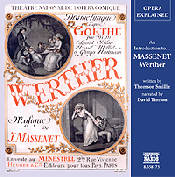For sure, not a CD which most people would play every day, and though, Thomson Smillie has not re-invented the wheel, therein lies the beauty. Most opera aficionados do not know the little secrets Smillie so casually and cleverly points out. Who would have thought that Meyerbeer, Halevy, Herold or Auber did not start the trend later known as Grand Opéra? Who would have thought that French “musical style,” as uniquely French as Champagne, is not really French? And the food? Of course don’t ask a Frenchman.
This overview, as written by Smillie, is clever, instructive, humorous, detailed, extremely interesting, and though fact filled, it is not boring. Smillie takes the listener from the beginning of opera, in Florence Italy, to the present. Different phases of the art form are touched upon, and the author provides plenty of examples of different operas, and vocal, or instrumental snippets to pique one’s interest.
Smillie goes on to explain the sequence and relationship between the different French composers (some of whom were not born in France!) finally settling on Massenet, and his opera, Werther. The author provides background information on Goethe, and how he came to write The Sorrows of Young Werther, upon which the opera is based. Prior to detailing the plot of the opera, Smillie provides some information on other Massenet operas and his progress as a composer.
From the opening chords in the overture to the last note of the opera, Smillie explains the important, and not so important details in the story and in the music, along with other interesting bits of information. Again, the listener is treated to many musical examples that directly relate to the explanation of the work, and of the musical moments being discussed. By the end of the CD, the listener feels as familiar with Werther, as one who has listened to the opera countless times.
Thomson Smillie, better known for his involvement with Wexford Festival, the Opera Company of Boston, and the Kentucky Opera, has written the “Opera Explained” series for Naxos, which includes two dozen titles.
Side by side with Smillie is the “voice” of the story, David Timson, who narrates the “Opera Explained” series. Timson studied acting and singing, and has taken part in several successful stage and television presentations, in addition to recording a series of audio books for Naxos. Timson’s unique voice is well suited for this kind of platform; he has a slight “English” accent which is never pompous, or difficult to understand; he has a fantastic sense of timing; his diction is impeccable, and his pronunciation of “foreign words” is accurate, but never affected. The timbre in his voice is quite pleasant, and it adds enough sophistication to the recording to make it, in addition to Smillie’s text, well worth listening to the complete CD.
The musical excerpts of Werther are from a Naxos recording of the opera (Werther-Naxos 8.660072-73) with Marcus Haddock, Béatrice Uria-Monzon, and René Massis leading the cast.
Even though there is never too much information, this CD is not for those who live and breathe opera. This series, “Opera Explained” is the ideal vehicle for someone who is starting to develop a taste for opera, or for those who would not venture to buy an opera recording without knowing anything about it, or simply, when wanting to have some general background information on a composer, or a particular work.
The liner notes are informative, and provide a synopsis of the opera.
Daniel Pardo 2005
Sources
Liner notes by Thomson Smillie
© 2005 Naxos
